An architect and yogi offers insights on how to design your spiritual sanctuary
by Maegan Walton
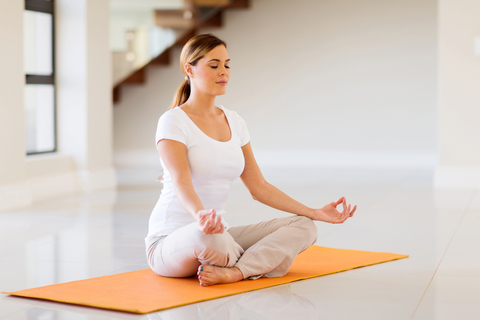
Carving out a home wellness space for yoga, meditation, and other healing modalities is an amazing way to bring more balance and harmony into your life. Our dwellings provide a divine connection to our inner worlds, and are a haven from the outer world. The more peace we infuse into our homes, the more peace we will have to share with others.
As an architect with a home yoga studio business, I have sculpted my wellness space to enhance the healing experiences that take place within. The soothing energy produced emanates throughout the entire house! Here are some tips to help you create a sanctuary in your home.
Find a Place for Your Space
I have a dedicated room for wellness practices, but even a cozy corner of a living area or studio apartment can become a tranquil, private area once it has been carved out and adorned with your wellness items.
Take time to ponder what portion of your living space will work for your wellness practice. Do you live in a house? Consider using a portion of a guest room or even a large closet. If you are in an apartment, seek out a corner or a wall space that can be dedicated to your practice.

If you intend to practice yoga in your wellness space, designate an area large enough for a yoga mat, ideally with about eighteen inches of buffer space around it. If possible, leave the yoga mat in place for spontaneous Downward Dogs or a few conscious breaths to ground your energy between work and household activities!
Do you plan to use your space primarily for meditation? Find a spot that is roomy enough for a comfortable cushion to sit on and a folded blanket to cradle your legs. If you are new to meditation, place the cushion against a wall for back support during your practice, or use a chair.
The more peace we infuse into our homes, the more peace we will have to share with others.
Divide and Create
As shown in the images that I gathered below, there are many creative ways to carve out a private wellness space that is separate from the rest of your living area, even if you don’t have a lot of space in your home to work with.
- A ceiling-mounted track with a beautiful curtain (or a colorful blend of curtains) can delineate an area for your practice
- Use a decorative screen to divide your space and create a visual barrier for privacy
- Open bookcases and modern shelving systems can create a pleasing visual divider between adjacent spaces and also house your wellness items (peruse the products offered by companies like Ikea and All Modern to see what might work in your space)
- If you have limited space to work with, separate your private area from the rest of the room with a tall plant (or two!)
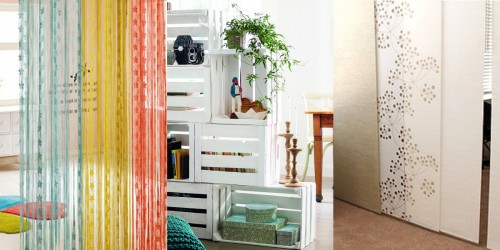
Subtract Distractions
It is important to keep your wellness space free of distractions, including sounds. One of the best ways to find serenity during a wellness practice is to be sure that you practice at a time when other activities (both indoor and outdoor) 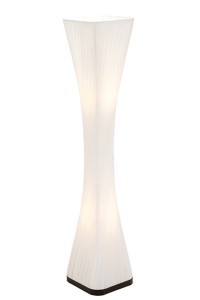 are quiet. If this is not possible, consider getting a set of wireless headphones to wear while practicing to tune out disturbances.
are quiet. If this is not possible, consider getting a set of wireless headphones to wear while practicing to tune out disturbances.
Warm, soft light is essential, so create a healing glow with ambient lighting. Lamps and sconces are ideal, as they filter and conceal the light source, avoiding glare. (All Modern, Mayfair, and Sears offer sleek modern floor lamps like the one shown at right.)
If your existing lighting is recessed into the ceiling, see about adding a dimmer switch to soften the light so that if you choose to lie down for Savasana or other reclining poses, you will not be distracted by a bright light overhead.
Add Inspiration
One of the best (and easiest) ways to personalize your wellness
space is to create an altar or display of personal and sacred items. Gather the things that inspire you, such as small statues, pictures, plants, incense, essential oils, singing bowls, candles, or books.
Wall-mounted shelving units (such as the vertical design shown in the group of images gathered below) provide space-saving ways to display books and other treasures. Position your items on multiple shelves so that some are at eye level when meditating, and some are at eye level while practicing yoga. Play with repositioning the items so that they have relationships to one another that are pleasing to you.
Plants are an excellent way to add color and texture to your sacred area. Wall-mounted vases, such as the modern modular design by Urbio shown below, add visual interest to compact spaces.
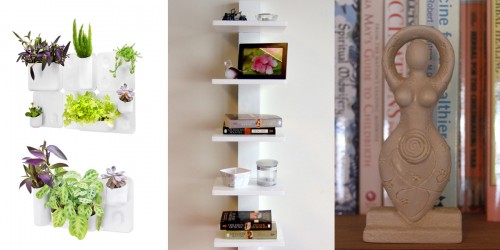
Once you have created an orderly and pleasing display, clean the area regularly as dirt and dust can also be a distraction. Remove the ash from incense sticks, wipe up wax overflow, and sweep away the dust that may settle over time. If you have plants in your sacred area, keep them thriving.
By cleaning this space and polishing your sacred items you will be nurturing the special energy they offer, helping you to reconnect with the meaning they bring to your wellness space.
Gather the things that inspire you, such as small statues, pictures, plants, incense, essential oils, singing bowls, candles, or books.
House Your Props
To avoid mental clutter, avoid having clutter in your wellness  space. If possible, dedicate a shelf, bin, or hook for each of your items so that they are easy to store. If you have a beautiful yoga mat, add eyelet holes to the corners and hang it on the wall as art.
space. If possible, dedicate a shelf, bin, or hook for each of your items so that they are easy to store. If you have a beautiful yoga mat, add eyelet holes to the corners and hang it on the wall as art.
If tidy and well designed, the storage of props can also become a part of your altar display, honoring your props as you would your sacred items.
Color Your World
One of the most cost-effective ways to personalize a space is to paint. What a difference a little paint can make! Choose a color that corresponds with your wellness intentions. If you’d like to be soothed, choose calming tones; if you’d like to be invigorated, choose colors that get your attention and help you to focus.
For me, the color blue encourages going with the flow, as it summons memories of water and its graceful movements. In my 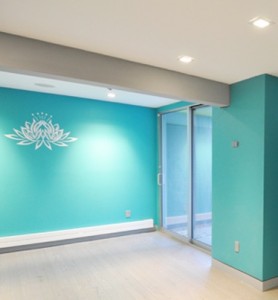 studio, I used the Benjamin Moore color “Cozumel.” When illuminated by the sun, filtered through trees, this color really does portray the ocean in Mexico! And I find that oh-so-pleasing. Benjamin Moore’s Aura line is Green Promise Certified and doesn’t emit VOCs (volatile organic compounds), making it an eco-friendly option for your healing space.
studio, I used the Benjamin Moore color “Cozumel.” When illuminated by the sun, filtered through trees, this color really does portray the ocean in Mexico! And I find that oh-so-pleasing. Benjamin Moore’s Aura line is Green Promise Certified and doesn’t emit VOCs (volatile organic compounds), making it an eco-friendly option for your healing space.
If painting your space is not an option, introduce color through your accessories and props. Be sure that the colors you choose are consistent and correspond with one another to avoid distraction and visual clutter. Perhaps start with choosing your yoga props or wellness accessories, as their colors are sometimes limited, then let these shades inspire the way you color your space.
Celebrate the Sacred
Creating a home wellness space is a mindful practice. Take the time to find an ideal space to designate for sacred moments. Resist the temptation to rush; instead, let it evolve over time. Once the perfect area of your home has been carved out, adorn it with your most pleasing wellness items and props, then filter out clutter and remove stimulation that will be a nuisance.
I enjoy filling my home with an ambiance of serenity and peace so that those who visit leave feeling renewed. My wellness spaces help me to feel renewed as well. Let the creation of your wellness space be both meditative and artful, and celebrate the healing that takes place within.
Maegan Walton, AIA, LEED AP, has been working in the field of architecture since 2002. In 2012, she started her own practice, Soglia Studios. Also a certified yoga instructor, Maegan founded and designed Yogitecta studio in Rye Brook, which offers yoga instruction and wellness events. For information, contact her at maegan@yogitecta.com.
Photo credits: Meditating woman © Michaeljung | Dreamstime.com; Woman doing yoga at home © Magann | Dreamstime.com; Yogitecta studio © Maegan Walton
Product sources: colorful curtains shown at hangingroomdividers.com; modern floor lamp by Woodland Imports (brand available at allmodern.com, mayfair.com, and Sears); wall-mounted plant module by Urbio; spine wall bookcase by Proman

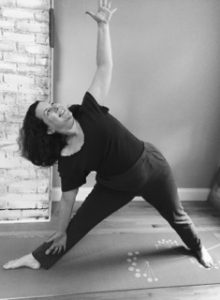
 raining, it must be Tuesday, because rain showers and gray skies seem to favor our practice time. I recently reminded my students that there are many delightful shades of gray that are not the least bit dreary. The vast Benjamin Moore gray color palette includes some yummy-sounding ones: Full Moon, Mineral Ice, Deep Space. To these I would add my own “custom” favorites: Fluffy Bunny Gray and Wolf Pup Gray.
raining, it must be Tuesday, because rain showers and gray skies seem to favor our practice time. I recently reminded my students that there are many delightful shades of gray that are not the least bit dreary. The vast Benjamin Moore gray color palette includes some yummy-sounding ones: Full Moon, Mineral Ice, Deep Space. To these I would add my own “custom” favorites: Fluffy Bunny Gray and Wolf Pup Gray. Selene, the sweetest cat I have ever known, is fur-coated in her own personalized shade, Loving Kitty Gray. We named Selene after the Greek goddess of the moon (hence all those e’s) when we adopted her because our son Harrison (then eleven years old) said that the irregular pattern of her silky gray and white fur reminded him of the dimpled silvery surface of the moon. (Her full name is Selene Moonbeam.) Selene is shown at right in one of her favorite yoga poses, Donut-Shaped Kitty Savasana. She is an expert at it!
Selene, the sweetest cat I have ever known, is fur-coated in her own personalized shade, Loving Kitty Gray. We named Selene after the Greek goddess of the moon (hence all those e’s) when we adopted her because our son Harrison (then eleven years old) said that the irregular pattern of her silky gray and white fur reminded him of the dimpled silvery surface of the moon. (Her full name is Selene Moonbeam.) Selene is shown at right in one of her favorite yoga poses, Donut-Shaped Kitty Savasana. She is an expert at it!






 are quiet. If this is not possible, consider getting a set of wireless headphones to wear while practicing to tune out disturbances.
are quiet. If this is not possible, consider getting a set of wireless headphones to wear while practicing to tune out disturbances. 
 space. If possible, dedicate a shelf, bin, or hook for each of your items so that they are easy to store. If you have a beautiful yoga mat, add eyelet holes to the corners and hang it on the wall as art.
space. If possible, dedicate a shelf, bin, or hook for each of your items so that they are easy to store. If you have a beautiful yoga mat, add eyelet holes to the corners and hang it on the wall as art.  studio, I used the Benjamin Moore color “Cozumel.” When illuminated by the sun, filtered through trees, this color really does portray the ocean in Mexico! And I find that oh-so-pleasing.
studio, I used the Benjamin Moore color “Cozumel.” When illuminated by the sun, filtered through trees, this color really does portray the ocean in Mexico! And I find that oh-so-pleasing. 